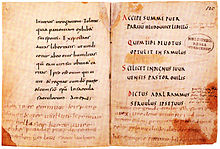- Muspilli
-
Muspilli is one of but two surviving pieces of Old High German epic poetry (the other being Hildebrandslied), dating to around 870. One large fragment of the text has survived in the margins and empty pages of a codex marked as the possession of Louis the German and now in the Bayerische Staatsbibliothek (cim. 14098). The beginning and end of the poem have not survived. It was re-discovered in 1817 and first published in 1832 by Johann Andreas Schmeller, who also titled it Muspilli, after a central word in the text.
The poem has been theorized as a Christianized version of the pagan Ragnarök, with figures represented in 13th century sources swapped with Christian figures; Surtr replaced by the Antichrist whom Elias - replacing Thor - fights, Loki by the old fiend.[1] In the Norse Ragnarök, Muspelheim and Muspel play a large role, and both versions involve a wolf. Grau proposes a connection of all of the material in the poem except for two verses to the 4th century theologian Ephraim the Syrian.[2]
Contents
Title etymology
The etymology and meaning of the term Muspilli (a hapax legomenon in Old High German, though forms of the word are attested in Old Saxon and Old Norse) is uncertain, but it is surmised to describe some sort of cataclysmic end of the world in fire (ekpyrosis). The poem is an example of early Germanic Christianity, combining pagan elements with the Biblical or Christian concepts, featuring Elijah, the Antichrist and the Last Judgement. Muspel and Muspil translate as "Muor's" "Maris" "Marsh" Pfell. Where Fell is the Norse word for Hill. What they are describing is a moss covered hill often used as a smithery. Because it was used as a smithery it may have doubled as a lighthouse. During this time period Iron was extracted from the moss/marsh. Look at cognates example Musbach, Musholm, Musberg, Mushorn, Musdolch, Musgaard, Musland, Musdal, Mushom, Mustraum, Masfjord and Musfjel... They suggest somewhere between the 9th and 12th Century. In addition, the battle of Maserfeld or Maserfield in Mercia is an associated example of this early loss of r - 9th Century. Moss-trooper or Mostrooper being a later example.
Text
The focus of the text is first on the fate of the soul after death. The hosts of heaven and hell do battle over the deceased individual's soul and the winning party will carry it off as booty (v. 1-37). Attention then shifts to another battle, the battle between Elijah and the Antichrist, which the text says will precede the Last Judgement. The two combatants are fighting as champions for God and the Devil, respectively. The Antichrist will fall but Elijah will be wounded and his blood dripping on the Earth will set the world on fire – announcing the muspilli (v. 38-56). The rest of the poem is concerned with the Resurrection and Judgment Day itself (v. 57-103).
Verses 44-54:
- der antichristo stet pi demo altfiant,
- stet pi demo Satanase, der inan uarsenkan scal:
- pidiu scal er in deru uuicsteti uunt piuallan
- enti in demo sinde sigalos uuerdan.
- doh uuanit des uilo ... gotmanno,
- daz Elias in demo uuige aruuartit uuerde.
- so daz Eliases pluot in erda kitriufit,
- so inprinnant die perga, poum ni kistentit
- enihc in erdu, aha artruknent,
- muor varsuuilhit sih, suilizot lougiu der himil,
- mano uallit, prinnit mittilagart
- The Antichrist stands with the old fiend,
- With the Satan, who will ruin him:
- On the battlefield, he falls wounded
- And in battle without victory
- But many men of God ween
- That Elijah will be wounded in that battle,
- When the blood of Elijah drips onto the soil
- The mountains will burn, no tree will stand,
- Not any on earth, water dries up,
- Sea is swallowed, flaming burn the heavens,
- Moon falls, Midgard burns
Notes
References
- Keary, Charles Francis (1882). Outlines of Primitive Belief Among the Indo-European Races. C. Scribner's sons.
- G. Grau (1908). Quellen und Verwandtschaften der Älteren germanischen Darstellungen des Jüngsten Gerichtes. Halle.
External links
Categories:- Epic poems in German
- Germanic mythology
- Old High German literature
- Eschatology
Wikimedia Foundation. 2010.

